„Demographic Development in the Nordic Countries and Germany“
Annual Meeting of the DGD – 20. – 22. March 2024 at the University of Hamburg
In Cooperation with the Demographic Societies of the Nordic Countries

With support from the University of Hamburg
The German Society for Demography (DGD) is proud to report from its annual conference in 2024, held in cooperation with the demographic societies of the Nordic countries, which took place from 20-22 March 2024 at the University of Hamburg. The conference addressed a wide range of thematic sessions on the „Demographic Development in the Nordic Countries and Germany“ (see below for sessions) and concluded with a moderated panel discussion on „Political Best Practice and Demographic Normality. Lessons for Germany from the Nordic Countries“. The event was held in English in a hybrid format and was well attended, with around 120 participants. On the day of arrival, the DGD reception took place after the general meeting and on the evening of the second day, participants were invited to a conference dinner in the restaurant „Parlament“.
In his opening address, the President of the DGD, Prof Dr Nobert F. Schneider, spoke about the reciprocal influences of social change and demographic development. He emphasised that a better understanding of this relationship is of central importance for the future development of the world and called for better conditions for demographic research in Germany: easier access to reliable and robust data, more investment in demographic theory development, a significant expansion of the academic representation of demography at German universities and more comparative research based on intensified international cooperation. Schneider concluded that these are necessary to understand the interactions between culture, structure and behaviour as well as the resulting changes in demographics.
In the opening session the conference heard greeting addresses from
- Ms Katharina Fegebank, Senator for Science, Research and Equality in the Hamburg parliament and
- Prof. Dr. Cord Jakobeit, Dean of the University of Hamburg.
The programme comprised a total of 15 sessions with 59 presentations (see below) – with a focus on the comparative analysis of population trends in the Nordic countries and Germany. The sessions were prepared and chaired by the speakers of the DGD working groups and representatives of the partner societies. A Book of Abstracts with a list of authors is available here.
Six keynote speeches were given during the conference:
- Stefanie Kley (local host Hamburg): Migration, Spatial Mobility and the Ecological Question
- Rannveig Hart (Norway): Fertility and Policy in Germany and the Nordics
- Cosmo Strozza (Denmark): Challenges to the Implementation of Indexation of Retirement Age
- Mika Gissler (Finland): How Covid Pandemic Affected Mortality Rates in Nordic Countries and Germany?
- Jonas Helgertz (Sweden): Using Methods of Machine Learning to Create Databases for (Historical) Demographic research
- Martin Bujard (Germany): FReDA – examples of analyses on fertility intentions, use of Medically Assisted Reproduction and parental employment
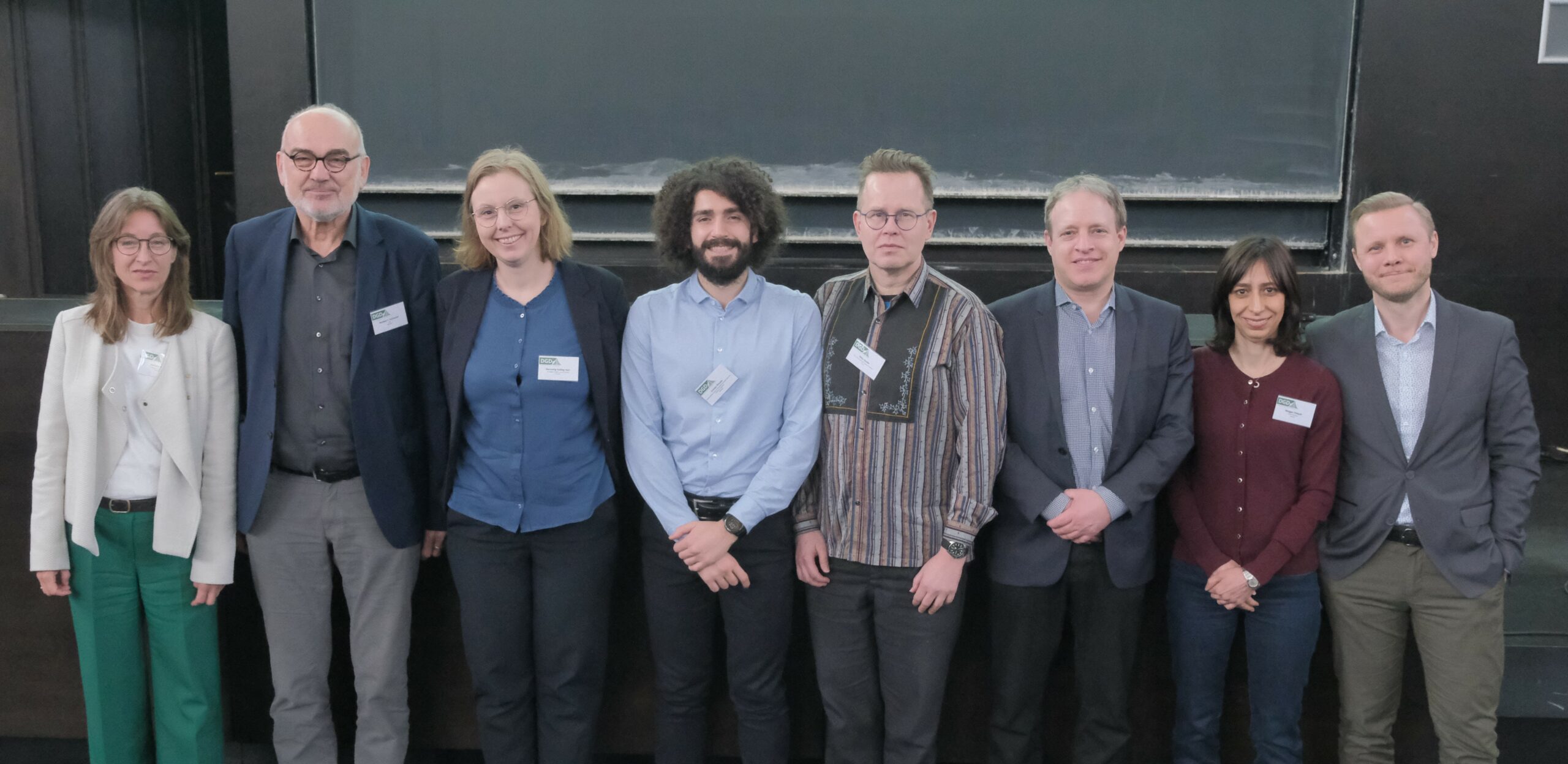
Hosts and keynote speekers (© DGD)
In addition to the general meeting (DGD members have access to the minutes of the meeting in the password-protected member area) and a meeting of the working group leaders with the DGD Executive Board, the traditional young scientists‘ breakfast also took place as part of the supporting programme. Organised by Annelene Wengler from the Robert Koch Institute and Sven Drefahl from the University of Stockholm, young researchers had the opportunity to discuss with Prof. Dr Stefanie Möllborn from Stockholm University and the University of Colorado in Boulder and Dr Sebastian Klüsener, Research Director at the Federal Institute for Population Research (BiB) their professional experiences.
The DGD’s young talent awards for master’s theses and dissertations in 2024 has been awarded to two persons each.
For their master thesis:
- Elias Hofmann: „The effect of moving distance on income returns in Germany“
- Sigsten Stieglitz: „Ethnic-based discrimination experience and its effect on the mental health and well-being of Refugees in Germany: A secondary data analysis of the IAB-BAMF-SOEP Survey of Refugees“
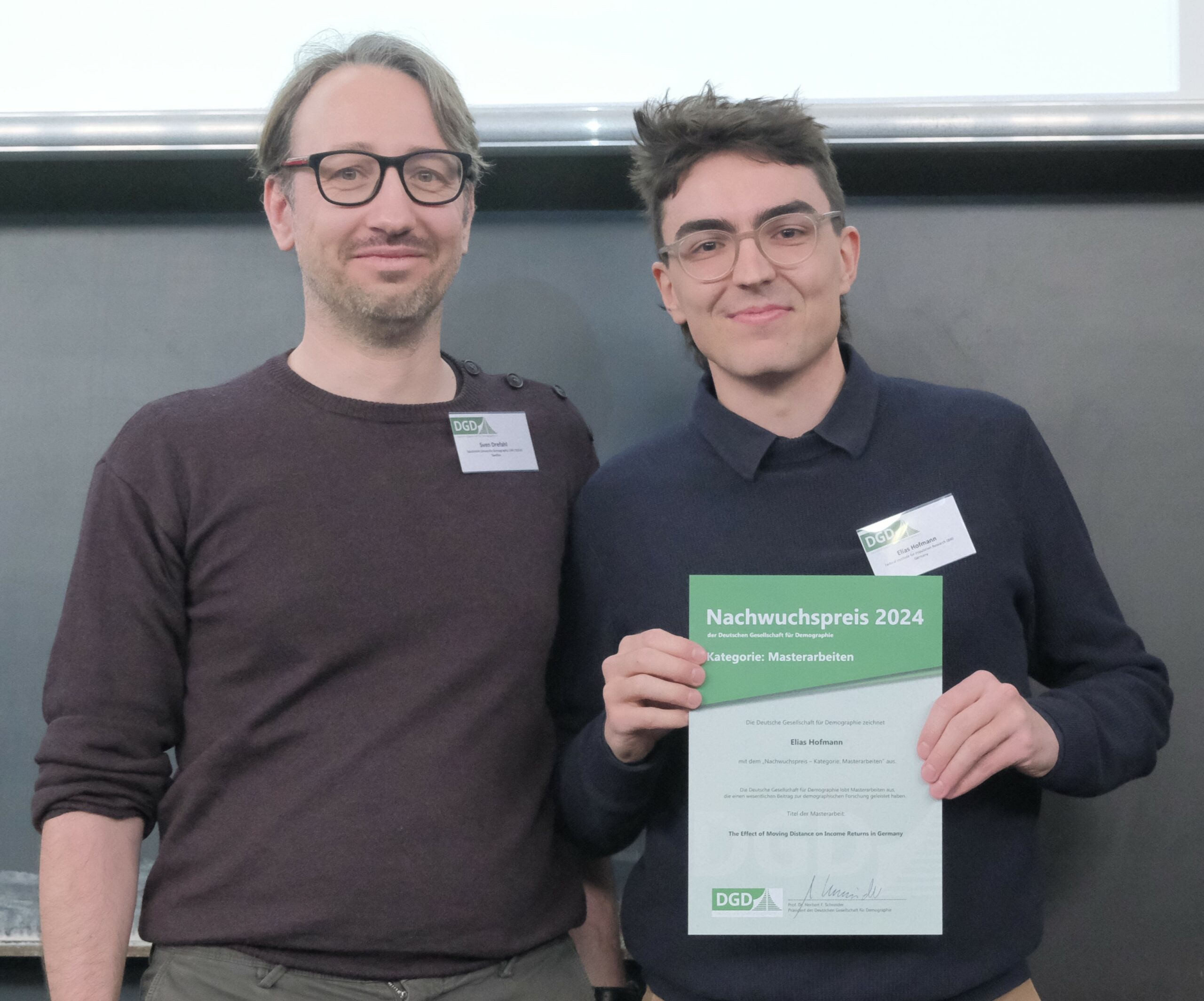

DGD awards master thesis (© DGD)
and for their dissertations:
- Benjamin Aretz: „Health consequences of exposure to environmental living conditions“ and
- Tabea Naujoks: „The division of labor in couples with children. A dyadic analysis in the German context“.
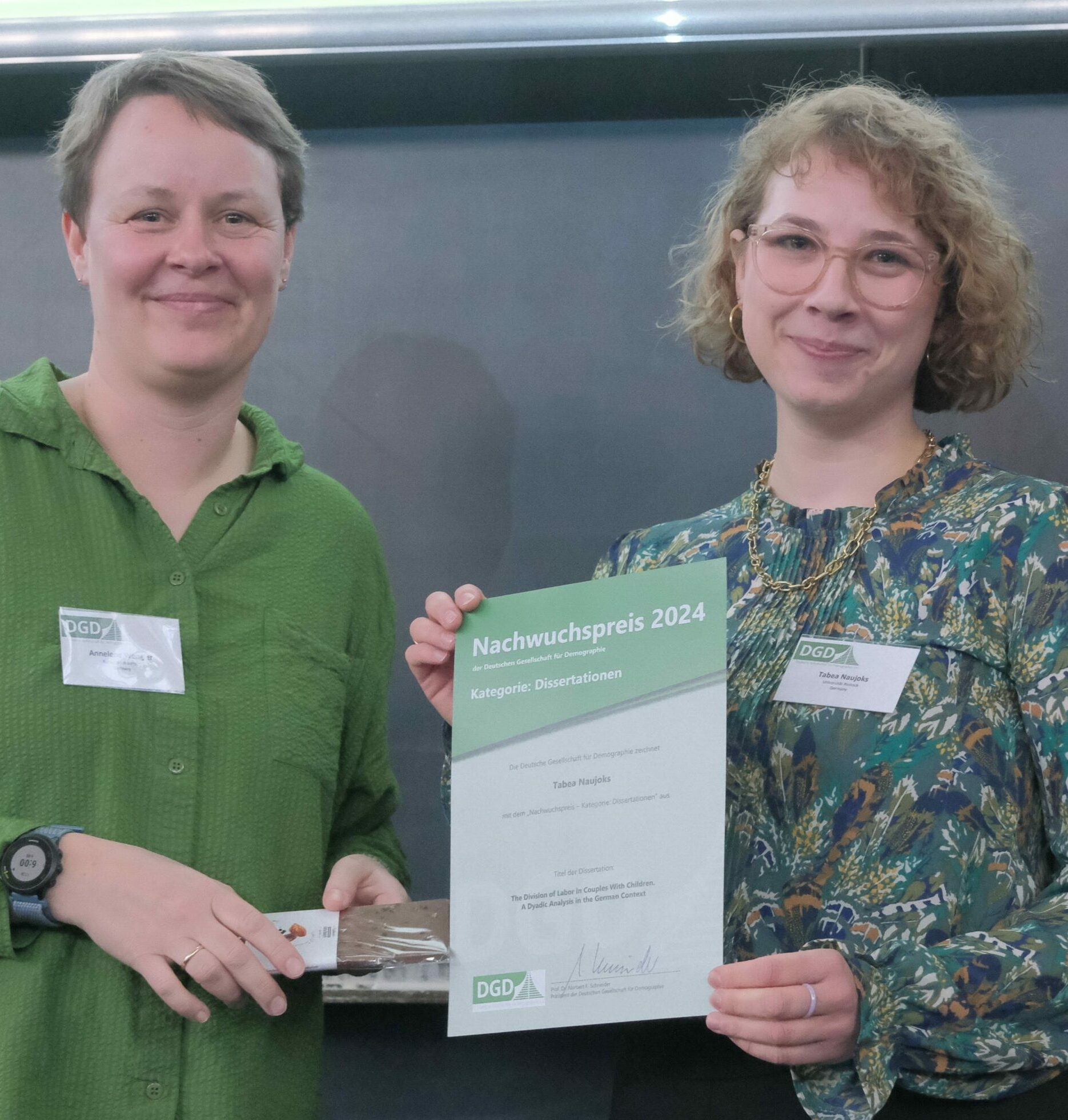

DGD awards dissertations (© DGD)
The DGD Best Paper Award 2024 was also awarded to two persons:
- Bettina Hünteler (University of Cologne): “A new perspective on the generational structures of families – Generational placements over the life course” https://doi.org/10.1016/j.alcr.2021.100450
- Michael Mühlichen (BiB Wiesbaden) et al.: „Different health systems – Different mortality outcomes? Regional disparities in avoidable mortality across German-speaking Europe, 1992-2019” https://doi.org/10.1016/j.socscimed.2023.115976

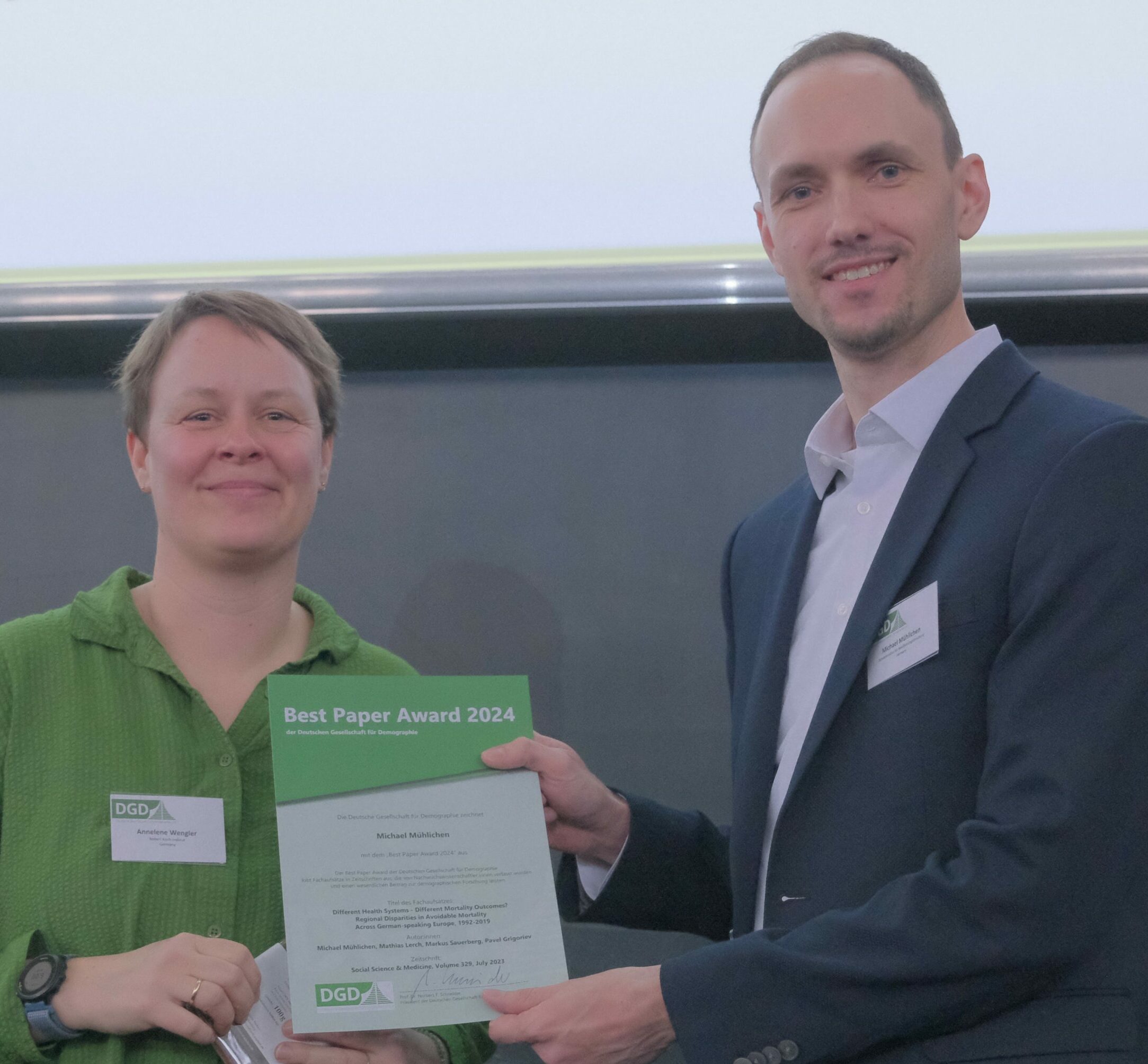
DGD best paper awards (© DGD)
In the interactive Poster-Flash-Session, out of ten short presentations, Maxi Stella Kniffka was awarded the DGD Best Poster Award 2024 for the poster „Stillbirth Rates across Europe. The Importance of Maternal Age and Multiple Pregnancies” (with Jonas Schöley as co-autor).

DGD best poster award (© DGD)
The Nordic welfare states were considered a model case in terms of demographic policy for a long time. However, this positive perception has lessened in recent years due to falling birth rates and growing disparities in life expectancy. Moderated by Dr. Andreas Edel (Population Europe / Max Planck Institute for Demographic Research), international experts discussed recent changes and consequences for policy making:
- Dr Annette Baudisch, University of Southern Denmark, Interdisciplinary Centre on Population Dynamics
- Dr Vegard F. Skirbekk, Senior researcher at the Norwegian Institute of Public Health, Olso
- Dr Norbert F. Schneider, Präsident DGD, Goethe University Frankfurt
- Dr Jessica Nisén, University of Turku, University Research Fellow at the INVEST Research Flagship Centre and Docent, Department of Social Research
- Uģis Zanders, Council of the Baltic Sea States, Advisor for the Priority Area Sustainable and Prosperous Region, Stockholm.
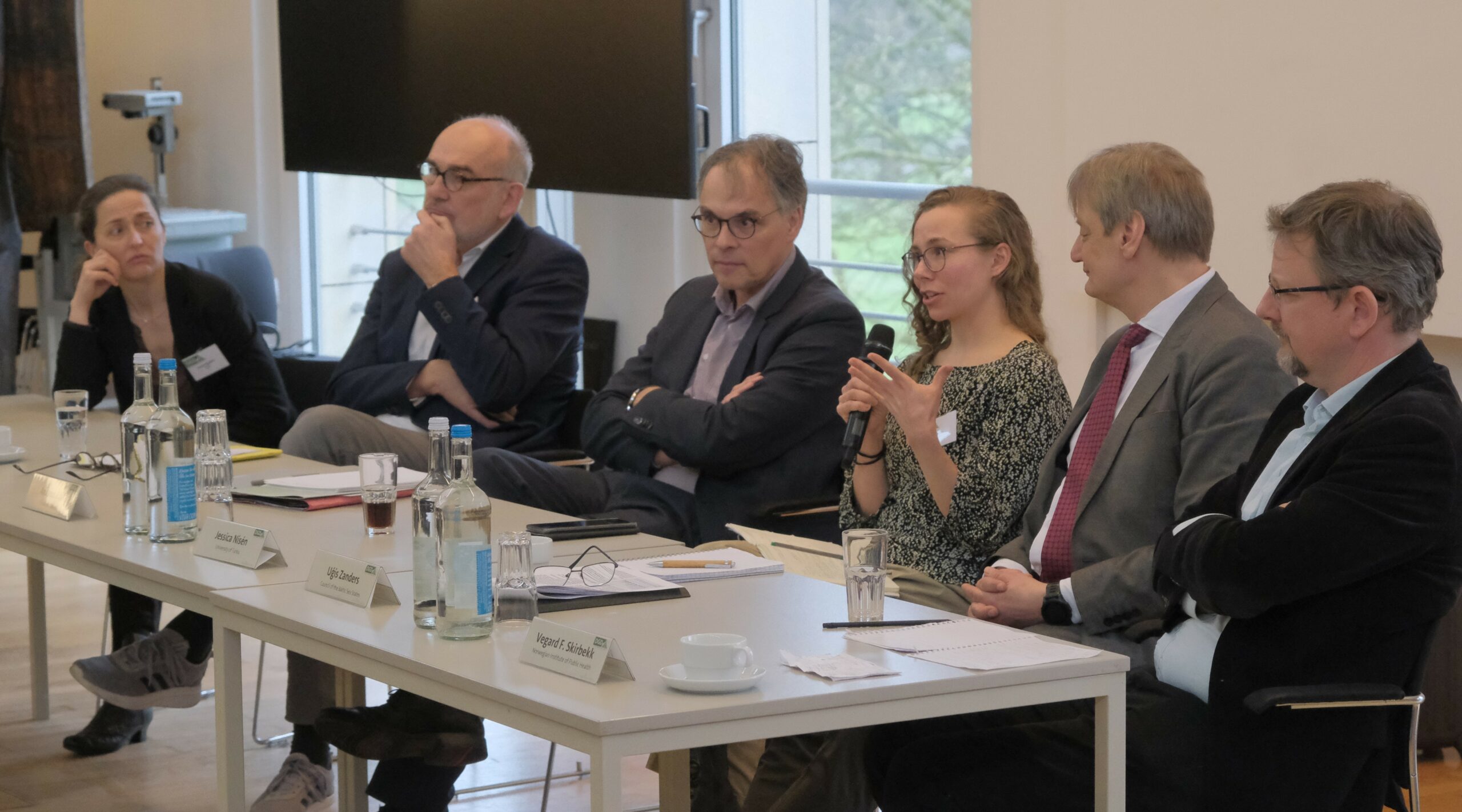
Panel discussion (© DGD)
In his opening presentation, Vegard F. Skirbekk addressed the fertility decline in the Nordic countries and emphasised that the declines in cohort fertility were less dramatic than in period fertility (TFR) and that investments in skills, for example, could help to overcome the consequences of demographic change. Jessica Nisén pointed out that the decline in fertility had to be viewed in a regionally differentiated perspective, for example, regional disparities in Finland had decreased. To explain the regional disparities in fertility levels, the role of differences in culture and lifestyles must also be taken into account, said Skirbekk. Uģis Zanders added that there is a demand for lifelong learning in the Nordic countries in order to keep skills up to date. Annette Baudisch explained that another problem was that not all population groups were benefiting from the increase in life expectancy and that the welfare state was not doing enough to reduce this inequality. Norbert Schneider emphasised the importance of migration: there is increasing international competition for qualified migrants. The predicted population decline because of low fertility had not materialised as expected due to the high level of immigration. Regional disparities in migration gains and losses must also be considered here. Skirbekk warned that the problem of ageing could not be solved by immigration and that this was not yet sufficiently understood by the public. Baudrich pointed out that in Denmark, as in East Germany, the acceptance of immigration was low and that this should change. Andreas Edel summarised the discussion, in which many individual aspects were addressed, and emphasised that it was important for population-related policies to learn from international examples and to clarify what works where and under what circumstances as part of a policy evaluation.
In his concluding statement, Schneider made four demands on politicians to mitigate the social consequences of demographic change: faster integration of immigrants into the labour market, further investment in reconciliation of work and private life, more flexible structures for the transition from working life into retirement and a departure from the three-phase life course model. Instead, there needs to be a change in terms of lifelong learning, lifelong activity and granting longer periods of rest, even in middle adulthood.
Norbert Schneider and Stefanie Kley thanked all participants and contributors on behalf of the DGD and the local host. Special thanks went to the local organisation team.

University of Hamburg local organisation team (© DGD)
Participants can now access their receipts and a confirmation of participation after login to the conference website here.
A complete list of presentations including abstracts and slides (if provided by authors) can be found here (available until March 2025).
The Book of Abstracts including the list of contributors is available here.
Sessions
(please klick button to unfold table)
| 1A & 2A Population Change in the Nordic Countries and Germany - Population & Place/A Comparative Perspective on Fertility |
| Session Chair: Bernhard Köppen (Koblenz) In a comparative perspective, Nordic Countries and Germany differ in multiple ways: the size of the countries and number of population as well as density and the share of urban versus rural areas or spatial distribution of urban centres are obvious examples. They also differ in their economic and social conditions as well as politics and policies relevant to demographic trends. However, also similar (or seemingly similar?) trends occur between the Nordic countries and Germany. For this session papers on the macro level, investigating historic or current trends in population change, for a single country or in a comparative setting, are invited. Furthermore, regional demographic chances and spatial patterns are not only of academic interest, but also bear relevant information for regional policy and planning. Thus, presentations on demographic trends revealing specific spatial patterns or geography-bound changes related to population are also invited to discuss the presented findings with a comparative perspective in mind. |
| 3A Social inequalities in health and reproduction (BIOSFER/MaxHel) |
| Session Chairs: Christian Dudel (Rostock) Rannveig Kaldager Hart (Oslo) High-income countries are experiencing increasingly polarized health and reproductive outcomes with growing social gradients. Key theories have struggled to explain these patterns and trends. For health outcomes, there has been an extensive and growing body of research documenting inequalities, but there are still major shortcomings of our understanding of the causal drivers. For reproductive outcomes, modern theoretical approaches are based on the empirical observation that until recently fertility remained comparatively high in gender-egalitarian countries with strong support for families. However, since 2010 many of the countries that provided evidence for such theories have reached record-low fertility. Two German-Nordic research initiatives aim to tackle these open questions, leveraging high-quality register and survey data, multiple theoretical perspectives, and novel methodological approaches. The Max Planck-University of Helsinki Center for Social Inequalities in Population Health (MaxHel) will exploit a completely unique data landscape combining register data with information on family structures and genes to understand what factors are producing health inequalities. The project “BIOSFER -Untangling biologic and social causes of low fertility in modern societies” investigates how social, biological, and psychological factors work together to produce the observed patterns, levels and variation in reproductive outcomes, with a focus on young adults. It is a collaboration of the Norwegian Institute of Public Health, Aarhus University in Denmark, and the Max Planck Institute for Demographic Research, Germany. In this session, BIOSFER and MaxHel team members will present first results and ongoing work. |
| 4A European Perspectives on migration (invited speakers) |
| Session Chair: Sonja Haug (Regensburg) •Frank Heins, Stefano degli Uberti (Italy): Drivers of international migration (Confirmed) •Bernd Parusel (Sweden): The Ukrainian Refugee Situation: Lessons for EU Asylum Policy (confirmed) •Izabela Grabowska (Poland): An Assessment of Human Resources of Ukrainian Labour and Forced Migrants in Poland (Confirmed, online-presentation) •N.N., N.N. |
| 5A New Perspectives and Methodological Innovations in Migration and Integration Studies |
| Session Chairs: Susanne Schmid (München) Eleonora Mussino (Stockholm Friday) Haodong Qi (Malmö) We welcome contributions on the data situation and the state of integration in Europe in various dimensions, for example in the labour market or the situation of migrant families. The aim here is to look at cross-country comparative analyses. We welcome paper submissions that are related to migration and integration including, but not limited to: •The drivers of international migration •Determinants of immobility •Migration and ageing •Non-traditional and large-scale data for migration research •Policy and governance •Data privacy and ethical considerations. We welcome theoretical, methodological, and empirical contributions from all disciplines. We also encourage participation from the stakeholder community, including governments, civil society organizations, the private sector, international and regional agencies, and professional bodies. |
| 1B Union formation and dissolution in Central and Northern Europe |
| Session Chairs: Peter Fallesen (Copenhagen) Sabine Diabaté (Wiesbaden) Over the past decades, the traditional constructs of marriage are now navigating through the currents of individualism, economic dynamics, and changing gender roles. Cohabitation has become an alternative to marriage, altering the landscape of partnerships, commitments, and potential dissolution. Consequently, the region's demography transforms as marriage and family structures evolve. We endeavor to unravel the multifaceted tapestry of divorce and union dissolution trends in Central and Northern Europe. Therefore, we invite presentations from demographers, sociologists, and other disciplines on the following aspects: •Changing patterns: Analyzing shifts in divorce rates, marriage duration, and cohabitation trends across different countries in the region. •Socioeconomic influences: Investigating the impact of economic factors, education, and employment on divorce and separation decisions. •Legal and policy dynamics: Exploring the role of legal frameworks, policies, and family law reforms in shaping divorce patterns. •Intersections with parenthood: understanding how parenting, custody arrangements, and child support impact the decision to dissolve unions. •Psychological and emotional dimensions: Examining the emotional toll, well-being, and coping strategies of individuals experiencing divorce. •Cultural and religious factors: Investigating how cultural norms and beliefs influence divorce and separation attitudes. •Comparative analyses: Contrasting divorce trends and outcomes between Central and Northern Europe and other global regions. |
| 2B Family diversity in Central and Northern Europe |
| Session Chairs: Kateryna Golovina (Helsinky) Rannveig Kaldager Hart (Oslo) Anne-Kristin Kuhnt (Rostock) Over the last 30 decades, European fertility moved toward a new pattern where most women have fewer than two children, and childlessness is increasingly common. Moreover, family patterns and the ways families are created have become more complex in recent European Societies. With our working group "Fertility and Family," we want to shed light on these changes and invite presentations from demographers, sociologists, and related disciplines on the following topics: - Recent trends in cohort and period fertility. - Comparative analyses between Central and Northern Europe or other global regions – including country-specific regional differences. - Fertility variation across different populations or subpopulations. - (Social structural) determinants of family formation over the life course. - Childlessness and infertility. - Family diversity. |
| 3B Pension Reforms in the Nordic Countries and Germany |
| Session Chairs: Philipp Deschermeier (Köln) Christina Wilke (Bremen) As a part of the Annual Conference, the Working Group “Demographic and Social Developments” invites contributions for a special session on “Pension Reforms in the Nordic Countries and Germany”. Contributions may address any of the following themes or pursue similar relevant research questions in this field: •Sustainability of public pension systems. •Reform effects of selected public pension reform measures. •Pension system projections. •Importance and institutional settings of occupational and/ or private pension schemes (e.g. Opting-in/ Opting-out rules etc.). •Importance and institutional settings of additional private pension schemes. •Analyses of the overall public-private policy mix. •Country comparisons. •Old-age poverty in Europe. |
| 4B & 5B Recent trends in fertility in Nordic Countries and Germany I & II |
| Session Chairs I: Kateryna Golovina (Helsinky) Rannveig Kaldager Hart (Oslo) Anne-Kristin Kuhnt (Rostock) Session Chairs II: Jessica Nisén (Turku) Aiva Jasilioniene (Rostock) The last two decades have been characterized by different trends in period fertility in the Nordic countries and Germany. In the first decade of the century, the total fertility rate (TFR) was relatively stable in Germany and mainly on the increase in the Nordic countries. These trends reversed in the second decade: period TFR declined strongly in the 2010s in Finland, Iceland and Norway, and moderately in Sweden and Denmark. In Germany, the second decade was characterized by increase and stability. In 2020, the lowest TFR among these countries was recorded in Finland (1.37), TFRs in Germany (1.53) and Norway (1.48) were at a similar level, while TFRs in the other Nordic countries remained at a higher level (1-68-1.72). Fertility did not decline in any of these countries in response to the early Covid-19 pandemic, but there were declines in 2022. The session intends to discuss these recent and ongoing fertility trends, their underlying drivers and theoretical explanations, as well as their relation to and repercussions for cohort fertility. We particularly welcome insights on recent period and cohort fertility trends in these countries by parity, age group, socio-economic group, region of living, and migrant (vs. native) status. The session is also open to insights on recent fertility trends in other countries. |
| 1C How Covid pandemic affected mortality rates in Nordic Countries and Germany? |
| Session Chairs: Mika Gissler (Helsinki) Jonas Schöley (Rostock) The full impact of the COVID-19 pandemic has been much greater than what is indicated by reported deaths due to COVID-19 alone. During the whole pandemic, Denmark and Sweden have reported more deaths per capita (more than 200/100 000) than Finland and Denmark (150-190/100 000) or Norway and Iceland (below 110/100 000). However, the comparability of these figures has been questioned. Further research is warranted to help distinguish the proportion of mortality that was directly or indirectly caused by SARS-CoV-2 infection. Also studies on the changes in the distribution of causes of death as an indirect consequence of the pandemic as well studies on excess mortality and its components are required. This session welcomes contributions in the following domains: •Trends: Contributions describing trends in life expectancies, COVID-19 deaths and distributions of causes-of-deaths during different phases of the pandemic and their associations to different countermeasures in Germany and the Nordic countries. •COVID-19 and excess mortality differences and between population groups: Contributions investigating the mortality and its causes between (vulnerable) population groups. •Methods: Contributions that aim to explore different measurements of life expectancies, COVID-19 deaths and excess mortality, including also future trajectories and scenarios in population statistics. |
| 2C Social inequalities in morbidity and mortality in a comparative perspective |
| Session Chairs: Cosmo Strozza (Odense) Daniela Georges (Rostock) Mojgan Padyab (Umea) Social inequalities contribute to significant differences in the risk and the course of diseases and disabilities, as well as mortality, thus representing a major public health concern. Social inequalities in morbidity, disability, and mortality persist in high-income countries, with considerable variations across and within countries, and over time. The underlying mechanisms are incompletely understood, and the ongoing developments, including those caused by the COVID-19 pandemic, highlight the complex and dynamic nature of health disparities. This session will focus on the social determinants of health, their regional variations, and temporal trends. We welcome submissions exploring various health outcomes (e.g., physical health, psychological health, wellbeing/subjective health, morbidity, (healthy) life expectancy), and different social determinants (e.g., socioeconomic status, sex/gender, regional factors), with comparative perspectives (e.g., within countries, across countries, time trends). Papers focusing on the following topics are welcome: •The impact of social inequalities on morbidity and mortality •Regional variations in morbidity and mortality within and across Germany and the Nordic countries •Trends in (healthy) life expectancy across and within countries •Contributions to the advancement of (healthy) life expectancy •Trends and patterns in causes of death |
| 3C & 4C Demographic Data and Methods for Western and Northern Europe I & II |
| Session Chairs: Gabriele Doblhammer (Rostock) Patrizio Vanella (Göttingen) Nico Keilman (Oslo) The DGD working group on “Demographic Methods” invites submissions for presentations at the joint meeting of the DGD with the Nordic demographic societies that revolve around methodological advances in demography, with a special focus on the conference topic. Contributions that present established or new demographic data for Western or Northern European countries or sub-national regions are especially welcome. We invite submissions that revolve around methodological approaches or statistical analysis estimating demographic data (including approaches for data linkage) or computing forecasts, particularly for the named regions. International or interregional comparative contributions are especially encouraged. The topic of the call is very flexible, spanning theoretical approaches or more practical applications, such as fertility and family research, migration, morbidity and mortality, or labor market and other economic topics. However, submissions are not restricted to the conference topic. We are open to other submissions on demographic or epidemiological data or methods as well. We look forward to your submissions! |
| 5C New challenges and opportunities in register data research |
| Session Chairs: Mojgan Padyab (Umea) Olga Pötzsch (Wiesbaden) Silvia Rizzi (Odense) The need for population statistics is changing significantly. This underscores the importance of national-level data for both research and policy interventions. Researchers require more frequent and timely data as well as results that provide detailed breakdown. The utilization of national register data in population studies is increasingly prominent, particularly within Nordic countries. Germany is still in the process of setting up the statistical register. In the session “Register-based research” at the joint meeting of the DGD with the Nordic demographic societies, we welcome contributions that present the opportunities and challenges in setting up and maintaining registers as well as using registry-based data in any field of demography (e.g., fecundity, fertility, family, migration, morbidity, and mortality). The aim is to •illustrate the use of register data in demographic research and show which demographic questions register data can answer. •describe the variety of options for using administrative data. •show opportunities and challenges that have been established from the use of register data in demography. •bring together experiences and best practices. |
| Panel: Political best practice and demographic normality. Lessons for Germany from the Nordic countries |
| The Nordic welfare states were considered a model case in terms of demographic policy for a long time. However, this positive perception has lessened in recent years due to falling birth rates and growing disparities in life expectancy. In this panel discussion, we would like to discuss with leading experts from research and practitioners which changes are emerging in the population trends of recent years, take stock of this development and deliberate on possible demographic policy conclusions. Moderation: Dr. Andreas Edel, Population Europe / Max Planck Institute for Demographic Research •Prof. Dr Annette Baudisch, University of Southern Denmark, Interdisciplinary Centre on Population Dynamics •Prof. Dr Vegard F. Skirbekk, Senior researcher at the Norwegian Institute of Public Health, Olso •Prof. Dr Norbert F. Schneider, Johannes Gutenberg University Mainz •Dr Jessica Nisén, University of Turku, University Research Fellow at the INVEST Research Flagship Centre and Docent, Department of Social Research •Uģis Zanders, Council of the Baltic Sea States, Advisor for the Priority Area Sustainable and Prosperous Region, Stockholm |
